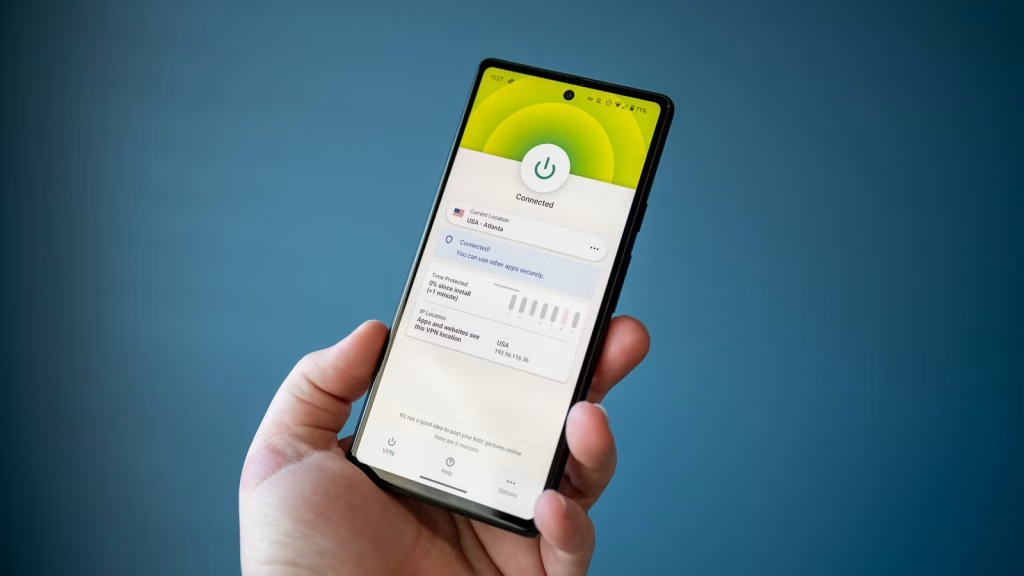Although a VPN encrypts your traffic and hides much of your online activity from your ISP, it’s a common misconception that it makes you completely invisible. Even with a VPN active, your ISP can still see specific details you might assume are hidden. Let’s explore what information they can access.
Your ISP Can Detect VPN Use
Credit: Lucas Gouveia/How-To Geek | Farknot Architect/Shutterstock
VPN traffic carries an encrypted “signature” that makes it stand out, allowing ISPs to detect it if they want. Since many VPNs rely on data center IP addresses, traffic routed through these addresses often indicates VPN use. Also, tunneling protocols such as OpenVPN or WireGuard operate on specific ports, making them easier to distinguish from regular HTTPS traffic.
Regular browsing produces varied, inconsistent requests, while VPN connections typically send packets of uniform size and timing—another telltale sign. Some ISPs use Deep Packet Inspection (DPI) to analyze traffic metadata. While the content may remain encrypted, the traffic structure can still expose that you’re using a VPN.
7/10
Logging policy
No-log policy
Mobile app
Android and iOS
NordVPN is one of the fastest VPN options available. It’s also easy to use and compatible with a variety of devices. For Black Friday, you can get the Basic plan for only $2.99/month if you sign up for two years, and you get three extra months for free.
When You Connect and Disconnect
Credit: Justin Duino / How-To Geek
Your VPN doesn’t hide the beginning or end of your sessions. This is because your device must first connect through your ISP before it can reach the VPN server. As a result, your ISP can still see the exact moments you go online or disconnect, even if it can’t monitor what you’re doing while connected. From this information, your ISP can estimate the duration of each session.
Over time, if you follow the same routine for days or weeks, your ISP can track your typical online schedule and identify patterns in your VPN use. With that knowledge, your ISP could choose to throttle your connection, slowing down your internet speed, and this slowdown might even affect you when you’re not actively using a VPN.
The Sites You Accessed
Credit:
Lucas Gouveia / How-To Geek | Nadia Snopek / Shutterstock
DNS requests are what convert a website’s name (such as google.com) into its corresponding IP address. A VPN is meant to route all your internet traffic through its encrypted tunnel, but if it’s misconfigured or lacks proper protection, these DNS requests can bypass it and go through your ISP’s servers. This is called a DNS leak.
Although DNS leaks are uncommon, they allow ISPs to see exactly which websites you visit. You may think your traffic is hidden, but in reality, your ISP could still be logging sites you look up. To prevent this, you can use a trusted VPN that includes strong DNS leak protection, but you still need to be aware of it.
Logging policy
No-logs policy
Mobile app
Android and iOS
The Volume of Data You Transmit
Credit:
Lucas Gouveia / How-To Geek | Tanveer Anjum Towsif / Shutterstock
Since your internet traffic always passes through your ISP’s network first, your provider can see when you connect or disconnect from a VPN server and measure how much data you upload or download. Even if your actual activity is hidden, they can still make assumptions about how you’re using the internet.
For example, sudden spikes in data usage may suggest large downloads or video streaming. By tracking these patterns, your ISP can build a clear picture of your overall internet habits and may choose to enforce data caps or throttle your speeds. So, while a VPN hides the details of your activity, it doesn’t conceal the volume of your usage.
Your VPN Server’s Location/IP Address
Credit: aurielaki / Shutterstock
Your ISP can also see the IP address of the VPN server you’re connected to, which means they can identify its approximate location, estimate the provider, and gauge how far your traffic is being routed. While this doesn’t reveal your browsing activity, it still gives your ISP enough context to act if they choose.
For example, if you regularly connect to servers in a specific country, your ISP might assume you’re accessing geo-restricted content. Similarly, if you frequently use the same servers for bandwidth-heavy tasks, your ISP could decide to block or throttle those connections—though such measures are relatively uncommon.
The VPN Provider You’re Likely Using
Credit: Kris Henges / How-To Geek
Most leading VPN services use IP ranges that belong to well-known data centers. If your Internet Service Provider notices your traffic consistently coming from these ranges, it’s possible for them to link it to a specific VPN provider. In other words, your ISP can figure out which VPN service you’re using if it wants to.
Using the knowledge of which VPN service you’re routing your traffic through, your ISP could slow down connections to that VPN’s servers or even block the provider entirely—particularly in regions where VPN usage faces strict limits. To me, that feels like a clear violation of my privacy and personal freedom of choice.
While a VPN helps protect your online activity, you must understand that it isn’t a magic invisibility cloak. Providers generally don’t dig into the details, but they can if they decide to—something worth keeping in mind. Choosing a reputable VPN service reduces the likelihood of such monitoring, making it worthwhile to invest in a trusted one.
This article was produced in partnership with NordVPN.


